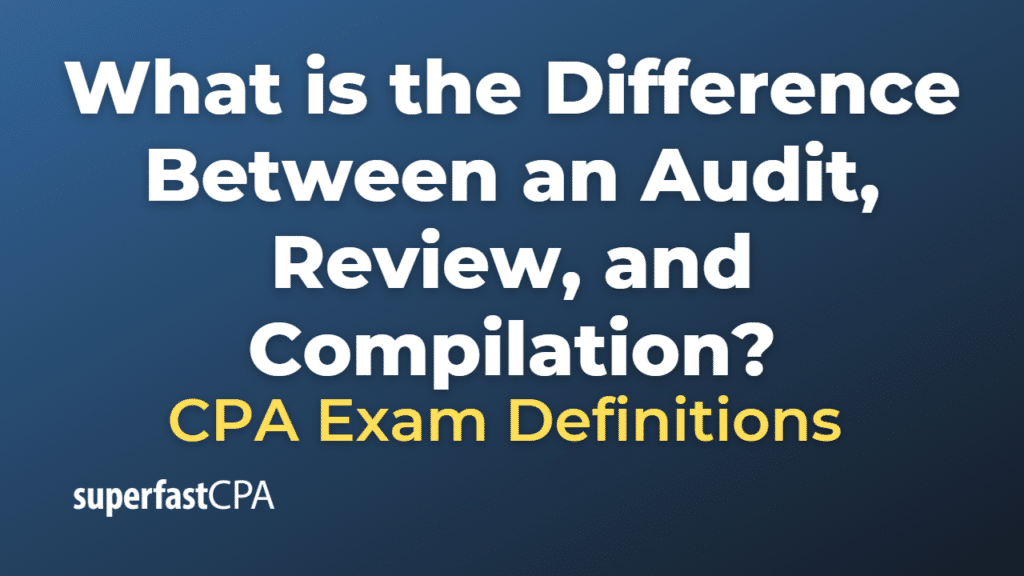Difference Between an Audit, Review, and Compilation
An audit, review, and compilation are three types of financial statement services a Certified Public Accountant (CPA) can provide for a business. They differ in the level of assurance provided and the depth of work involved.
- Audit: This is the highest level of assurance service provided by a CPA and is designed to provide a reasonable assurance that the financial statements are free from material misstatements. The auditor conducts a systematic review and objective examination of the financial statements, including verification of specific information as determined by the auditor or as established by general practice. This usually involves detailed testing of transaction level data and the effectiveness of internal controls. The aim is to provide an opinion about whether the financial statements are presented fairly, in all material respects, in accordance with the applicable financial reporting framework, usually Generally Accepted Accounting Principles (GAAP) or International Financial Reporting Standards (IFRS).
- Review: A review provides limited assurance and is less extensive than an audit. It primarily involves analytical procedures and inquiries of management rather than detailed testing and verification. A review should provide enough assurance to the users of the financial statements that there is no need for significant modifications to the statements for them to be in conformity with the applicable financial reporting framework.
- Compilation: This is the lowest level of financial statement service and provides no assurance about the accuracy of the financial statements. In a compilation, the accountant assists management in presenting financial information in the form of financial statements without undertaking to provide any assurance that there are no material modifications that should be made to the financial statements. In simpler terms, the accountant simply takes the information provided by the client and arranges it into proper financial statement format.
It’s important to note that the choice among an audit, review, or compilation depends on the company’s needs, such as the requirements of lenders or investors, and the size of the organization.
Example of the Difference Between an Audit, Review, and Compilation
Let’s imagine you are a business owner of a medium-sized manufacturing company, and you’re preparing for the end of your fiscal year. You decide to engage a Certified Public Accountant (CPA) to provide financial statement services, but you need to determine what level of service is appropriate.
- Audit: If your business has significant loans from a bank, the bank may require an audit. An audit would also be necessary if you were planning to take your company public or if your shareholders require it. In this process, the CPA will thoroughly examine your financial statements, verify specific information, test transaction-level data, assess internal controls, and ultimately provide an opinion about whether the financial statements fairly represent your company’s financial position and performance.
- Review: Suppose your business is smaller and doesn’t have the same level of external requirements for an audit. In that case, you might opt for a review. A review provides limited assurance about the financial statements but involves less detailed testing. For instance, if your company is seeking a smaller loan or looking to reassure potential investors, the bank or investors might be satisfied with a review. During a review, the CPA performs analytical procedures and makes inquiries to understand any unusual trends or variations in the financial statements.
- Compilation: If your business is quite small and you need help preparing the financial statements but don’t need to provide assurance to external users, a compilation might be sufficient. For example, you might need a compilation service if you are applying for a small business grant where the granting agency doesn’t require audited or reviewed financial statements. During a compilation, the CPA takes your financial data and puts it into a financial statement format without providing any assurance or conducting any testing.
Remember, the level of service you need will depend on your specific circumstances, requirements from external parties, and the complexity of your business’s financial situation.













